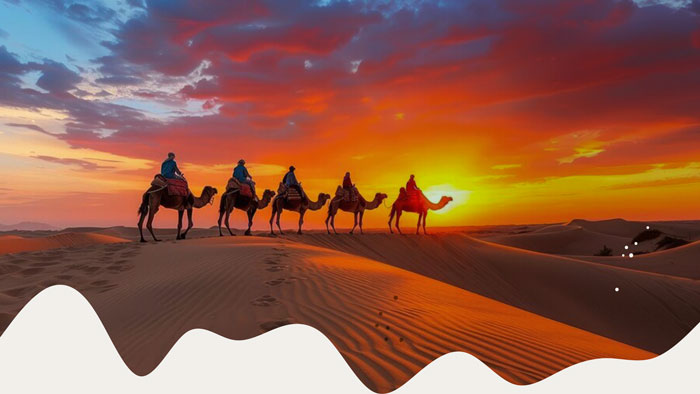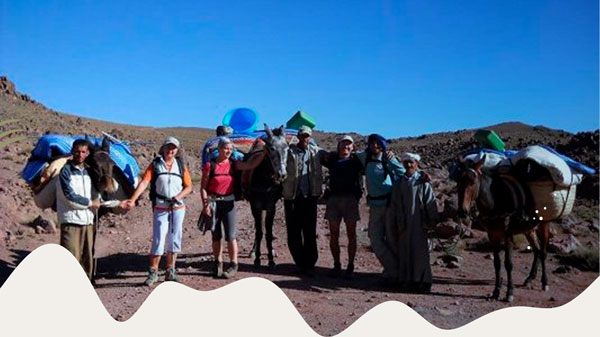
How to Live as a Nomad in the Moroccan Sahara: Experience Nomadic Life
Introduction
The allure of the endless dunes and star-studded skies of the Moroccan Sahara calls to the soul in search of simplicity, freedom, and connection. Here, beneath a canvas of brilliant constellations and amidst golden waves of sand, lies a way of life as ancient as time, the nomadic lifestyle.
For centuries, nomads have roamed the vast landscapes of southern Morocco, moving with the rhythms of nature and living in harmony with the desert’s harsh yet majestic environment. This blog post will take you on a journey into that world, offering insider insights, essential tips, and a deeper cultural understanding of what it truly means to live as a nomad in the Moroccan Sahara.
Understanding the Nomadic Lifestyle in Morocco
Who Are the Saharan Nomads?
Nomadic communities in the Moroccan Sahara primarily include Amazigh (Berber) tribes and, to a lesser extent, Tuareg groups, who historically traversed the vast Saharan trade routes. These tribes have long been the stewards of desert knowledge, adept in survival, navigation, and animal husbandry.
Nomads often live in mobile tents made of woven goat hair, providing ventilation and protection from the desert sun. Their lifestyle centers around herding, especially camels and goats, and moving seasonally in search of pasture and water.

Traditional Values and Way of Life
At the heart of nomadic culture lies a strong sense of community, hospitality, and respect for nature. Decisions are made collectively, and the extended family structure is fundamental. Stories, songs, and oral traditions pass down wisdom and values from generation to generation.
Seasonal Migration and Its Significance
Nomads traditionally migrate with the seasons, following grazing patterns and weather cycles. In the spring, they move toward the cooler, greener pastures; in the summer, they seek shade and water in oases and sheltered valleys.
This cycle is not random, it’s a deeply informed practice rooted in centuries of environmental knowledge, animal behavior, and spiritual connection to the land.
Modern Challenges to the Nomadic Lifestyle
Today, the traditional nomadic way faces climate change, modernization, and urban migration challenges. Droughts have become more frequent, and economic pressures push many toward sedentary life in towns. However, some families still preserve this ancient lifestyle, and a few even welcome respectful travelers to experience it with them.
Where to Experience Nomadic Life in the Moroccan Sahara
If you wish to live as a nomad in the Moroccan Sahara, choosing the right region is key. Some areas offer immersive and authentic experiences with real nomadic families, while others cater more to desert tourism. Here are the top spots:

Erg Chebbi (Merzouga)
One of Morocco’s most iconic dunes, Erg Chebbi offers both tourist camps and access to semi-nomadic families who reside nearby. While camel treks and tented accommodations are common, with the right guide, you can connect with authentic nomadic experiences.
Erg Chigaga (M’Hamid El Ghizlane)
For a more remote and less commercial experience, Erg Chigaga is ideal. Here, you can travel deeper into the desert with nomadic guides from M’Hamid, camp with families who still follow traditional migration patterns, and witness life with minimal modern influence.
Tafraoute Sidi Ali and the Draa Valley
Less known but rich in cultural authenticity, this region allows you to explore the intersection of settled Amazigh life and nomadic traditions. It’s a perfect place to witness camel caravans, ancient kasbahs, and semi-nomadic villages nestled in palm groves.
Tourist vs. Authentic Nomadic Immersion
Tourist camps often provide comfort and Instagram-worthy views, but authentic nomadic immersion requires stepping out of your comfort zone. Look for locally-owned experiences, small-scale family-run treks, and multi-day stays that go beyond the surface.
Ready to Experience Life as a True Nomad?
Join our authentic Sahara Desert tour and step into the world of Morocco’s legendary nomads. Trek across golden dunes, share tea with local families, and sleep under the stars in traditional desert camps. This isn’t just a trip, it’s a journey into a timeless way of life.
How to Live Like a Nomad: Daily Routines & Responsibilities
Living as a nomad is not just about traveling through the desert, it’s about embracing the rhythm of life that unfolds under the sun and stars. Here’s what a typical day might involve:
Setting Up and Breaking Camp
Nomads move frequently. Setting up camp includes pitching tents, arranging camel gear, and setting a cooking area. Breaking camp at sunrise is a communal effort, often done with remarkable speed and efficiency.
Herding Camels and Goats
Livestock is life. Every day includes checking on the herd, guiding them to pasture, protecting them from predators, and ensuring they stay hydrated. Camels are both transport and companions, while goats provide milk, meat, and wool.
Cooking and Sourcing Food
Meals are simple but flavorful, often cooked over open flames. Expect flatbread (aghroum), tagines, and fresh mint tea. Food is shared communally, and ingredients are sourced from nature or nearby towns during supply runs.
Water Sourcing and Conservation
Water is sacred. Nomads store water in goatskin bags or jerry cans and often travel long distances to find wells or oases. Every drop counts, and conservation is second nature.
Navigation and Desert Survival Skills
Nomads navigate by the sun, stars, and landscape features. They know how to read sand patterns, anticipate weather changes, and handle emergencies in isolation. These skills are crucial, and awe-inspiring to witness.
Cultural Etiquette and Respect
To truly live as a nomad in the Moroccan Sahara, respect and cultural understanding are essential. Here’s how to honor the experience:
Learning from Your Host Family
Listen, observe, and participate. Nomadic families are generous teachers, but you must show humility and willingness to learn.
Dress Code and Modesty
Desert life demands modest, practical clothing. Men and women should cover their arms and legs, and both sexes are encouraged to wear a cheche (desert scarf) for sun and sand protection.
Hospitality Traditions
Tea is more than a drink, it’s a ceremony of welcome and connection. Expect to be served mint tea multiple times a day. Storytelling, music, and shared meals build trust and community.
Participating in Local Customs and Festivals
If your visit aligns with a local festival or gathering, join in respectfully. These events may include music, dance, and poetry, offering a rare glimpse into the soul of Saharan culture.
Practical Tips for Immersing in the Nomadic Lifestyle
Before you head off into the dunes, make sure you’re prepared to live as a nomad in the Moroccan Sahara. Here’s what to bring and how to prepare:
What to Pack
-
Lightweight, breathable clothing (preferably long-sleeved and light-colored)
-
Desert boots or sturdy sandals for walking on hot sand and rocky terrain
-
Scarves or turbans (cheche) to protect against sun and sand
-
Reusable water bottles and solar chargers for off-grid living
-
Moisturizer and lip balm (the desert dries everything)
-
Notebook or journal for documenting your journey
Language Basics
Learning a few phrases in Tamazight or Moroccan Arabic (Darija) will go a long way. Try these:
-
“Azul” – Hello (Tamazight)
-
“La bes?” – How are you? (Darija)
-
“Choukran” – Thank you
-
“Afak” – Please
-
“Mashi mushkil” – No problem
Physical and Mental Preparation
Nomadic life is physically demanding. Prepare by building stamina and flexibility. Be ready for heat, isolation, and simplicity. Most importantly, open your mind to a lifestyle that may challenge your habits but deeply enrich your spirit.
How to Find Authentic Nomadic Experiences
Embarking on a nomadic journey in the Moroccan Sahara isn’t just about sightseeing, it’s about meaningful connections, cultural immersion, and ethical travel. Here’s how to ensure your experience is genuine and responsible:
Choosing Responsible and Ethical Tour Operators
Start by researching tour companies that prioritize sustainability, fair wages, and local partnerships. Look for operators who work directly with Berber or Tuareg families, respect traditional customs, and minimize environmental impact. Avoid mass tourism packages that exploit or misrepresent nomadic cultures.
Volunteer Programs and Cultural Exchange Opportunities
Many NGOs and grassroots initiatives in Morocco offer cultural exchange programs where travelers can live alongside nomadic communities, assist with daily tasks, teach languages, or help with sustainable development projects. These experiences go beyond tourism, they foster mutual understanding and empowerment.
Staying in Nomadic Camps vs. Glamping Options
Authentic nomadic camps are usually basic, with traditional wool tents, communal meals, and minimal technology. These stays allow for deeper cultural learning and connection. On the other hand, glamping (glamorous camping) offers more comfort, private tents, showers, and electricity, but may feel more curated. Choose based on your travel goals and respect for the nomads’ way of life.
Working with Local NGOs or Tribal Families
To truly support nomadic livelihoods, consider partnering with NGOs that focus on nomadic heritage preservation or educational access. Some families also open their homes or camps to guests for short stays. Your participation helps provide income and preserve endangered cultural traditions.
Balancing Modern Comforts with Nomadic Simplicity
Even in the most remote dunes of the Sahara, modernity quietly coexists with ancient ways. Adapting to this balance is part of the charm.
How Technology Blends with Tradition
You might be surprised to find solar panels charging mobile phones in tents woven by hand. Nomads embrace select technologies, like satellite phones, solar-powered lamps, and water pumps, without losing their traditional identity. This coexistence of old and new is a testament to their adaptability.
Journaling or Blogging from the Desert
Whether you’re documenting your journey in a paper notebook or writing a travel blog offline to upload later, the desert invites reflection. The silence, the stars, and the slower pace help you reconnect with your thoughts. Your story could inspire others to seek similar transformational experiences.
Mindfulness and Digital Detox Benefits
One of the most profound gifts of nomadic life is the chance to unplug. With limited (or no) Wi-Fi and no social media distractions, you’re free to live in the present, watching camels trek across dunes, listening to fire-crackled storytelling, and sharing tea under the open sky. It’s a detox for the soul.
Ready to Experience Life as a True Nomad?
Join our authentic Sahara Desert tour and step into the world of Morocco’s legendary nomads. Trek across golden dunes, share tea with local families, and sleep under the stars in traditional desert camps. This isn’t just a trip, it’s a journey into a timeless way of life.
Things to Learn from the Nomads
Living like a nomad, even briefly, offers a deep education in values that are increasingly rare in our modern lives.
Sustainability and Zero-Waste Living
Nomads live lightly on the land. Nothing is wasted—food scraps feed animals, worn fabrics are repurposed, and water is used sparingly. Their lifestyle is inherently sustainable, driven by necessity and respect for nature.
Resilience and Adaptability
Facing sandstorms, droughts, and changing migration routes, nomads are masters of resilience. They adapt their routes, rebuild what’s broken, and carry on with grace. Observing this strength is a humbling experience.
Connection to Nature and the Land
Nomads read the stars, the wind, and the shape of the dunes. Their survival depends on understanding the earth’s rhythms. In a world disconnected from the environment, nomadic life teaches us to tune in.
Strong Community and Family Bonds
Nomadic communities thrive on cooperation. Families travel together, share resources, and look out for one another. There’s little space for ego, only interdependence, hospitality, and mutual respect.
Challenges and What to Expect
Nomadic life is not romanticized ease, it comes with its own share of difficulties. Understanding these challenges helps you prepare mentally and physically.
Sandstorms, Isolation, and Limited Supplies
Expect unpredictable weather, including sandstorms that may halt all activity. Supplies like water, medicine, and fuel can be scarce. The isolation, while peaceful, can also feel intense for city dwellers.
Language Barriers and Cultural Misunderstandings
Most nomadic families speak Amazigh dialects or Arabic. Learning a few local phrases or hiring a translator helps bridge the gap. Remember, customs may differ; always ask before taking photos or joining in rituals.
Navigating Climate Extremes
Desert temperatures swing dramatically, scorching hot by day, bone-chilling at night. Pack accordingly: layers, sun protection, and insulated sleeping gear are essentials. Adjusting to the rhythm of desert life requires both physical and mental flexibility.
Final Thoughts: Is Nomadic Living Right for You?
Nomadic life isn’t for everyone, but even a few days in this world can reshape your mindset.
Who This Lifestyle Suits Best
If you crave simplicity, value cultural authenticity, and are open to discomfort in exchange for personal growth, this experience will resonate deeply. Adventurers, slow travelers, and mindful explorers tend to appreciate it most.
How Even a Short Stay Can Change Your Perspective
Living among nomads often shifts your views on consumption, connection, and what truly matters. You return with a greater appreciation for nature, time, and community. It’s not just travel, it’s transformation.
Travel Respectfully and Support Local Nomads
Above all, approach your journey with humility. Your presence should be a respectful exchange, not a spectacle. Pay fair prices, ask before photographing people, and support locally-owned businesses and cooperatives whenever possible.
Conclusion
Living as a nomad in the Moroccan Sahara is more than an adventure; it’s a doorway into an ancient, resilient, and inspiring way of life. From learning how to live sustainably to experiencing genuine human connection, the lessons of the desert are profound.
